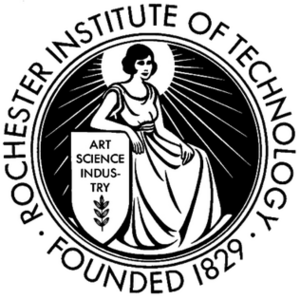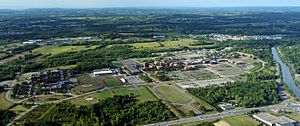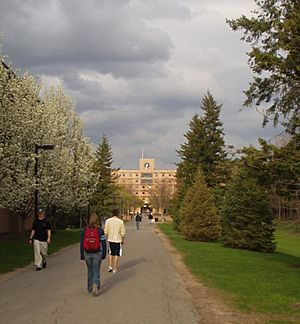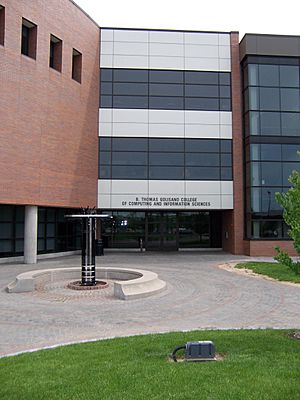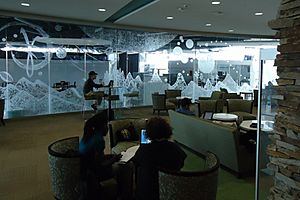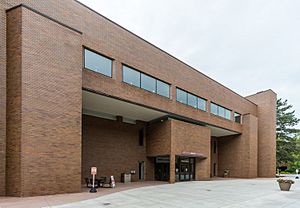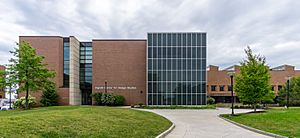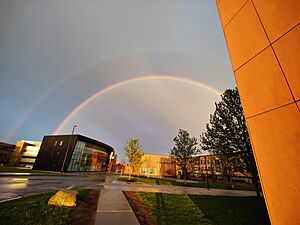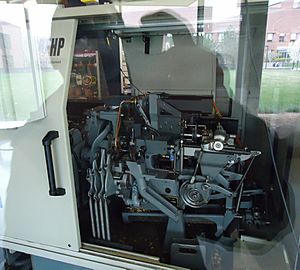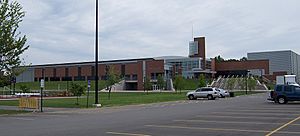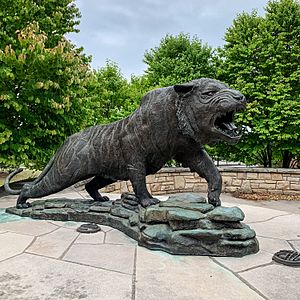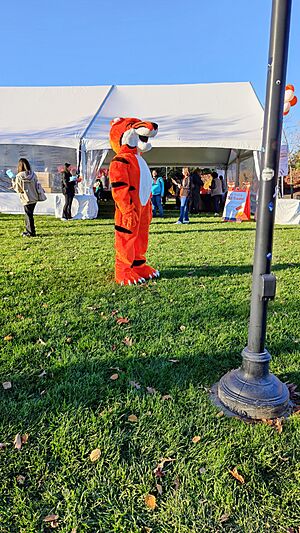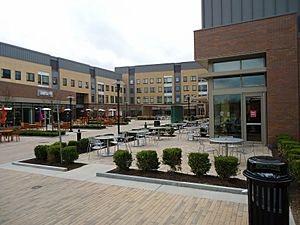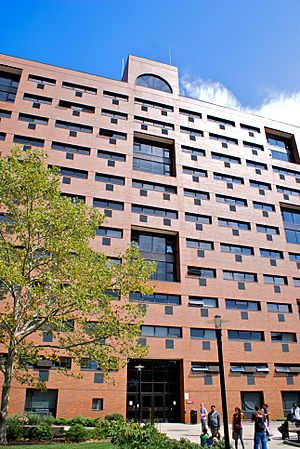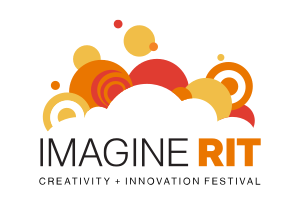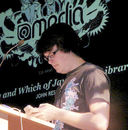Rochester Institute of Technology facts for kids
 |
|
|
Former names
|
Rochester Athenæum (1829–1891) The Mechanics Institute (1885–1891) Rochester Athenaeum and Mechanics Institute (1891–1944) |
|---|---|
| Type | Private research university |
| Established | 1829 |
|
Academic affiliation
|
|
| Endowment | $1.274 billion (FY23) |
| President | David C. Munson, Jr |
| Provost | Prabu David |
|
Academic staff
|
1,547 (Full-time, part-time, adjunct) |
|
Administrative staff
|
2,642 |
| Students | 20,570 |
| Undergraduates | 17,528 |
| Postgraduates | 3,042 |
| Location |
,
,
United States
43°05′05″N 77°40′34″W / 43.08472°N 77.67611°W |
| Campus | Suburban 1,300 acres (5.3 km2) |
| Colors | Orange and Brown |
| Nickname | Tigers |
|
Sporting affiliations
|
NCAA |
| Mascot | RITchie the Tiger |
 |
|
The Rochester Institute of Technology (RIT) is a private research university in Rochester, New York. It was founded in 1829.
RIT enrolls about 19,000 students, of whom 16,000 are undergraduate and 3,000 are graduate students. These students come from all 50 states in the United States and more than 100 countries. The university has more than 4,000 faculty and staff. It also has branches abroad in China, Croatia, Kosovo, and the United Arab Emirates.
The university is classified among "R2: Doctoral Universities – High research activity". Eleven RIT alumni, affiliates, and faculty members have been recipients of the Pulitzer Prize, winning a total of 15 prizes.
Contents
- History
- Campus
- Organization and administration
- Academics
- Research
- Athletics
- Student life
- Governance
- Notable alumni
- Presidents and provosts
- See also
History
The university began as a result of an 1891 merger between Rochester Athenæum, a struggling literary society founded in 1829 by Colonel Nathaniel Rochester and associates, and The Mechanics Institute, a Rochester school of practical technical training for local residents founded in 1885 by a consortium of local businessmen including Captain Henry Lomb, co-founder of Bausch & Lomb. The name of the merged institution at the time was called Rochester Athenæum and Mechanics Institute (RAMI). The Mechanics Institute was considered as the surviving school and took over The Rochester Athenaeum's 1829 founding charter. From the time of the merger until 1944, many of its students, administration and faculty staff alike, not only celebrated the former Mechanics Institute's 1885 founding charter, but its former name as well. In 1944, the school changed its name to Rochester Institute of Technology, re-established The Athenaeum's 1829 founding charter and became a full-fledged research university.
The university originally resided within the city of Rochester, New York, proper, on a block bounded by the Erie Canal, South Plymouth Avenue, Spring Street, and South Washington Street (approximately 43°09′09″N 77°36′55″W / 43.152632°N 77.615157°W). Its art department was originally located in the Bevier Memorial Building. By the middle of the twentieth century, RIT began to outgrow its facilities, and surrounding land was scarce and expensive; additionally, in 1959, the New York Department of Public Works announced a new freeway, the Inner Loop, was to be built through the city along a path that bisected the university's campus and required demolition of key university buildings. In 1961, a donation of $3.27 million from local Grace Watson, for whom RIT's dining hall was later named, allowed the university to purchase land for a new 1,300-acre (5.3 km2) campus several miles south along the east bank of the Genesee River in suburban Henrietta. Upon completion in 1968, the university moved to the new suburban campus, where it resides today.
In 1966, RIT was selected by the federal government to be the site of the newly founded National Technical Institute for the Deaf (NTID). NTID admitted its first students in 1968, concurrent with RIT's transition to the Henrietta campus.
In 1979, RIT took over Eisenhower College, a liberal arts college located in Seneca Falls, New York. Despite making a 5-year commitment to keep Eisenhower open, RIT announced in July 1982 that the college would close immediately. One final year of operation by Eisenhower's academic program took place in the 1982–83 school year on the Henrietta campus. The final Eisenhower graduation took place in May 1983 back in Seneca Falls.
The microelectronic engineering program, created in 1982 and the only ABET-accredited undergraduate program in the country, was the nation's first Bachelor of Science program specializing in the fabrication of semiconductor devices and integrated circuits. In 1990, RIT started its first PhD program, in imaging science – the first PhD program of its kind in the U.S. The information technology program was the first nationally recognized IT degree, created in 1993. In 1996, RIT became the first college in the U.S. to offer a Software Engineering degree at the undergraduate level.
Campus
The main campus is housed on a 1,300 acres (5.3 km2) property. This property is largely covered with woodland and fresh-water swamp making it a very diverse wetland that is home to a number of somewhat rare plant species. The campus comprises 237 buildings and 5.1 million square feet (470,000 m2) of building space. The nearly universal use of bricks in the campus's construction – estimated at 15,710,693 bricks as of August 6, 2018 – prompted students to give it the semi-affectionate nickname "Brick City," reflected in the name of events such as the annual "Brick City Homecoming." Though the buildings erected in the first few decades of the campus's existence reflected the architectural style known as brutalism, the warm color of the bricks softened the impact somewhat. More recent additions to the campus have diversified the architecture while still incorporating the traditional brick colors. The main campus was listed as a census-designated place in 2020.
In 2009, the campus was named a "Campus Sustainability Leader" by the Sustainable Endowments Institute.
The residence halls and the academic side of campus are connected with a walkway called the "Quarter Mile". Along the Quarter Mile, between the academic and residence hall side are various administration and support buildings. On the academic side of the walkway is a courtyard, known as the Infinity Quad due to a striking polished stainless steel sculpture (by Jose' de Rivera, 1968, 19'×8'×21⁄2') of a continuous ribbon-like Möbius strip (commonly referred to as the infinity loop because if the sun hits the strip at a certain angle it will cast a shadow in the shape of an infinity symbol on the ground) in the middle of it; on the residence hall side is a sundial and a clock. These symbols represent time to infinity. The Quarter Mile is actually 0.41 mi (0.66 km) long when measured between the mobius sculpture and the sundial. The name predates a Sigma Pi Fraternity fundraiser called Quarter the Quarter-Mile, where donated quarters were lined up from the sundial to the Infinity Sculpture. Standing near the Administration Building and the Student Alumni Union is The Sentinel, a steel structure created by the acclaimed metal sculptor, Albert Paley. Reaching 70 feet (21 m) high and weighing 110 tons, the sculpture is the largest on any American university campus. There are four RIT-owned apartment complexes: Global Village, Perkins Green, Riverknoll and University Commons.
Along the Quarter Mile is the Gordon Field House, a 160,000 sq ft (15,000 m2), two-story athletic center. Opened in 2004 and named in honor of Lucius "Bob" Gordon and his wife Marie, the Field House hosts numerous campus and community activities, including concerts, career fairs, athletic competitions, graduations, and other functions. Other facilities between the residence halls and academic buildings include the Hale-Andrews Student Life Center, Student Alumni Union, Ingle Auditorium, Clark Gymnasium, Frank Ritter Memorial Ice Arena, and the Schmitt Interfaith Center.
Art on campus
The RIT Art Collection, part of the RIT Archive Collections at RIT Libraries, comprises thousands of works, including hundreds by RIT faculty, students, and alumni. The collection grows every year through the Purchase Prize Program, which enables the university to purchase select art works from students in the School of Art and Design, the School for American Crafts, and the School of Photographic Arts and Sciences.
Many pieces from the collection are on public display around campus, including:
- Sentinel – a 73-foot-tall sculpture created by the acclaimed metal sculptor, Albert Paley, located on Administration Circle.
- Growth and Youth – a set of two murals by Josef Albers located in the lobby of the George Eastman Building.
- Principia – a mural by Larry Kirkland that is etched into the black granite floor of the atrium in the College of Science (Gosnell Hall). The work features illustrations, symbols, formulae, quotes, and images representing milestones in the history of science.
- Three Piece Reclining Figure No. 1 – a bronze sculpture by English artist Henry Moore located in Eastman Kodak Quad.
- Grand Hieroglyph – a 24-foot-long tapestry by Shiela Hicks located in the George Eastman Building.
- Sundial – a sculpture by Alistair Bevington located on the Residence Quad.
- The Monument to Ephemeral Facts – a mixed media sculpture by Douglas Holleley located in Wallace Library.
- Unity – a 24-foot-tall stainless steel sculpture sited between the College of Art and Design, the College of Engineering Technology, and the College of Engineering.
Demographics
The RIT campus is a census-designated place (CDP) with a population of 7,322.
| Race / Ethnicity | Pop 2020 | % 2020 |
|---|---|---|
| White alone (NH) | 4,728 | 64.57% |
| Black or African American alone (NH) | 384 | 5.24% |
| Native American or Alaska Native alone (NH) | 14 | 0.19% |
| Asian alone (NH) | 1,232 | 16.83% |
| Pacific Islander alone (NH) | 0 | 0.00% |
| Some Other Race alone (NH) | 45 | 0.61% |
| Mixed Race/Multi-Racial (NH) | 357 | 4.88% |
| Hispanic or Latino (any race) | 562 | 7.68% |
| Total | 7,322 | 100.00% |
Note: the US Census treats Hispanic/Latino as an ethnic category. This table excludes Latinos from the racial categories and assigns them to a separate category. Hispanics/Latinos can be of any race.
Organization and administration
As of 2017, the president is David C. Munson Jr., formerly the dean of engineering at the University of Michigan. Munson, the university's tenth president, took office on July 1, 2017, replacing William W. Destler, who retired after 10 years at RIT. Prabu David, formerly vice provost at Michigan State University, was named provost in August 2023. He replaced Ellen Granberg, the first woman to serve in that role at RIT.
The school is also a member of the Association of Independent Technological Universities.
Colleges
RIT has nine colleges:
- College of Art and Design
- Saunders College of Business
- Golisano College of Computing and Information Sciences
- Kate Gleason College of Engineering
- College of Engineering Technology
- College of Health Sciences and Technology
- College of Liberal Arts
- National Technical Institute for the Deaf
- College of Science
There are also two smaller academic units that grant RIT degrees but do not have full college faculties:
- Golisano Institute for Sustainability
- School of Individualized Study
In addition to these colleges, RIT operates three branch campuses in Europe, one in the Middle East and one in East Asia:
- RIT Croatia (formerly the American College of Management and Technology) in Dubrovnik and Zagreb, Croatia
- RIT Kosovo (formerly the American University in Kosovo) in Pristina, Kosovo
- RIT Dubai in Dubai, United Arab Emirates
- RIT China - Weihai
Academics
The university is chartered by the New York state legislature and accredited by the Middle States Association of Colleges and Schools. The university offers more than 200 academic programs, including seven doctoral programs across its nine constituent colleges. In 2008–2009, RIT awarded 2,483 bachelor's degrees, 912 master's degrees, 10 doctorates, and 523 other certificates and diplomas.
The four-year, full-time undergraduate program constitutes the majority of enrollments at the university and emphasizes instruction in the "arts & sciences/professions." RIT is a member of the Rochester Area College consortium, which allows students to register at other colleges in the Rochester metropolitan area without tuition charges. RIT's full-time undergraduate and graduate programs used to operate on an approximately 10-week quarter system with the primary three academic quarters beginning on Labor Day in early September and ending in late May. In August 2013, RIT transitioned from a quarter system to a semester system. The change was hotly debated on campus, with a majority of students opposed according to an informal survey; Student Government also voted against the change.
Among the eight colleges, 6.8% of the student body is enrolled in the Saunders College of Business, 15.0% in the Kate Gleason College of Engineering, 4.3% in the College of Liberal Arts, 25.4% in the College of Applied Science and Technology, 18.0% in the B. Thomas Golisano College of Computing and Information Sciences, 13.9% in the College of Imaging Arts and Science, 5.7% in the National Technical Institute for the Deaf, and 9.2% in the College of Science. The five most commonly awarded degrees are in Business Administration, Engineering Technology, School of Photographic Arts & Sciences, School of Art and Design, and Information Technology.
RIT has struggled with student retention, although the situation has improved during president Destler's tenure. 91.3% of freshmen in the fall of 2009 registered for fall 2010 classes, which Destler noted as a school record.
Student body
| Undergraduate | Graduate | U.S. census | |
|---|---|---|---|
| African American | 6.1% | 4.9% | 12.6% |
| Asian American | 6.9% | 6.9% | 4.8% |
| White American | 76.5% | 80.4% | 63.7% |
| Hispanic American | 7.3% | 6.0% | 16.4% |
| Multiple Races | 2.9% | 1.4% | 2.9% |
| Native American | 0.2% | 0.4% | 0.9% |
| International student | 778 | 1,472 | N/A |
RIT enrolled 13,711 undergraduate and 3,131 graduate students in fall 2015. Admissions are characterized as "more selective, higher transfer-in" by the Carnegie Foundation. RIT received 12,725 applications for undergraduate admission in Fall 2008, 60% were admitted, 34% enrolled, and 84% of students re-matriculated as second-year students. The interquartile range on the SAT was 1630–1910. 26% of students graduated after four years and 64% after six years. As of 2013, the 25th–75th percentile SAT scores are 540–650 Critical Reading, 570–680 Math, and 520–630 Writing—the average composite score being 1630–1960.
| USNWR National University | 98 |
|---|---|
| Washington Monthly National University | 218 |
| Forbes | 217 |
Rankings
|
U.S. News & World Report, 2023 Graduate Rankings |
|
|---|---|
| Biological Sciences | 119 |
| Business | 112 |
| Computer Science | 77 |
| Engineering | 63 |
| Fine Arts | 23 |
| Health Care Management | 65 |
| Online MBA | 9 |
| Photography | 6 |
| Physician Assistant | 188 |
| Physics | 78 |
In 2017, RIT was ranked No. 97 (tie) in the National Universities category by U.S. News & World Report. Business Insider ranked RIT No. 14 in Northeast and No. 36 in the country for Computer Science. RIT was ranked among the top 50 national universities in a national survey of "High School Counselors Top College Picks". RIT's Saunders College of Business ranked No. 26 in the United States for "Best Online MBA Programs" for the online executive MBA program by U.S. News & World Report. Times Higher Education/The Wall Street Journal ranked the MBA program at Saunders College of Business No. 54 among business colleges and universities around the world for the year 2019. RIT was ranked among the top 20 universities recognized for excellent co-operative learning and internship programs. It was further placed at No. 24 in the top 30 universities for Computer Science with the best Returns on Investment (ROI) in the US.
The Princeton Review ranked RIT No. 8 nationally for "top schools for video game design for 2019" in undergraduate programs and No. 7 in graduate programs. Among the top 75 universities for Video Game Design in the US, RIT was ranked No. 4.
Co-op program
RIT's co-op program, which began in 1912, is the fourth-oldest in the world. It is also the fifth-largest in the nation, with approximately 3,500 students completing a co-op each year at over 2,000 businesses. The program requires (or allows, depending on major) students to work in the workplace for up to five quarters alternating with quarters of class. The amount of co-op varies by major, usually between 3 and 5 three-month "blocks" or academic quarters. Many employers prefer students to co-op for two consecutive blocks, referred to as a "double-block co-op". During a co-op, the student is not required to pay tuition to the school and is still considered a "full time" student.
Library and special collections
The Cary Graphic Arts Collection contains books, manuscripts, printing type specimens, letterpress printing equipment, documents, and other artifacts related to the history of graphic communication. RIT Archives document more than 180 years of the university's history, and students in the Museum Studies program frequently work with these artifacts and help create exhibitions. The RIT/NTID Deaf Studies Archive preserves and illustrates the history, art, culture, technology, and language of the Deaf community. The RIT Art Collection contains thousands of works showcasing RIT's visual arts curriculum.
Vignelli Center for Design Studies
The Vignelli Center for Design Studies was established in 2010 and houses the archives of Italian designers Massimo and Lella Vignelli. The center is a hub for design education, scholarship and research.
ESL Global Cybersecurity Institute
Founded in 2020, the Global Cybersecurity Institute was funded in part by a $50 million gift from RIT alumnus Austin McChord. The gift also funded four named endowments for students and cybersecurity researchers. In 2022, the Institute received a $3 million naming gift from ESL Federal Credit Union, a Rochester-area company that provides banking and wealth management services.
Research
The total value of research grants to university faculty for fiscal year 2022 totaled $92 million. The university currently offers twelve PhD programs: Imaging science, Microsystems Engineering, Computing and Information Sciences, Color science, Astrophysical Sciences and Technology, Sustainability, Electrical and Computer Engineering, Biomedical and Chemical Engineering, Business Administration, Physics, and Mathematical Modeling.
In 1986, RIT founded the Chester F. Carlson Center for Imaging Science, and started its first doctoral program in Imaging Science in 1989. The Imaging Science department also offers the only Bachelors (BS) and Masters (MS) degree programs in imaging science in the country. The Carlson Center features a diverse research portfolio; its major research areas include Digital Image Restoration, Remote Sensing, Magnetic Resonance Imaging, Printing Systems Research, Color Science, Nanoimaging, Imaging Detectors, Astronomical Imaging, Visual Perception, and Ultrasonic Imaging.
The Center for Advancing the Study of CyberInfrastructure (CASCI) is a multidisciplinary center housed in the College of Computing and Information Sciences. The Departments of Computer science, Software Engineering, Information technology, Computer engineering, Imaging Science, and Bioinformatics collaborate in a variety of research programs at this center. RIT was the first university to launch a Bachelor's program in Information technology in 1991, the first university to launch a Bachelor's program in Software Engineering in 1996, and was also among the first universities to launch a Computer science Bachelor's program in 1972. RIT helped standardize the Forth programming language, and developed the CLAWS software package.
RIT has collaborated with many industry players in the field of research as well, including IBM, Xerox, Rochester's Democrat and Chronicle, Siemens, NASA, and the Defense Advanced Research Projects Agency (DARPA). In 2005, it was announced by Russell W. Bessette, Executive Director New York State Office of Science Technology & Academic Research (NYSTAR), that RIT will lead the University at Buffalo and Alfred University in an initiative to create key technologies in microsystems, photonics, nanomaterials, and remote sensing systems and to integrate next generation IT systems. In addition, the collaboratory is tasked with helping to facilitate economic development and tech transfer in New York State. More than 35 other notable organizations have joined the collaboratory, including Boeing, Eastman Kodak, IBM, Intel, SEMATECH, ITT, Motorola, Xerox, and several Federal agencies, including as NASA.
In 2017, the U.S. Department of Energy selected RIT to lead its Reducing Embodied-Energy and Decreasing Emissions (REMADE) Institute aimed at forging new clean energy measures through the Manufacturing USA initiative.
Athletics
RIT was a long-time member of the Empire 8, an NCAA Division III athletic conference, but moved to the Liberty League beginning with the 2011–2012 academic year. All of RIT's teams compete at the Division III level, with the exception of the men's and women's ice hockey programs, which play at the Division I level. In 2010, the men's ice hockey team was the first ever from the Atlantic Hockey conference to reach the NCAA tournament semi-finals: The Frozen Four.
In 2011–2012, the RIT women's ice hockey team had a regular season record of 28–1–1, and won the NCAA Division III national championship, defeating the defending champion Norwich University 4–1. The women's team had carried a record of 54–3–3 over their past two regular seasons leading up to that point. The women's hockey team then moved from Division III to Division I. Starting in the 2012–2013 season, the women's team played in the College Hockey America conference. In 2014–2015, the team became eligible for NCAA Division I postseason play.
In 2021, the RIT men's lacrosse team beat Salisbury in double overtime to take the NCAA Division III national championship. In 2022, the RIT men's lacrosse team won a second national title, following a 12–10 victory over Union College.
RIT's Alpine Ski Club competes at United States Collegiate Ski & Snowboard Association (USCSA), which uses NCAA II competition and academic standards. The varsity Alpine Ski Team competes at the USCSA Mid East Region.
Tom Coughlin, coach of the NFL's 2008 and 2012 Super Bowl champion New York Giants, taught physical education and was the head coach of the RIT Men's Varsity Football team for four seasons in the early 1970s. Overseeing RIT football's transition from a club sport to an NCAA Division III team, this was the first head coaching job of Coughlin's career with him calling his time at RIT "a great experience."
Since 1968 RIT's hockey teams played at Frank Ritter Memorial Ice Arena on campus. In 2010, RIT began raising money for a new arena. In 2011, B. Thomas Golisano and the Polisseni Foundation donated $4.5 million for the new arena, which came to be named the Gene Polisseni Center.
Mascot
RIT's athletics nickname is the "Tigers", a name given following the undefeated men's basketball season of 1955–56. Prior to that, RIT's athletic teams were called the "Techmen" and had blue and silver as the sports colors. In 1963, RIT students fundraised using ‘Tigershares’ to buy a rescued Bengal tiger cub that became the university's mascot, named SpiRIT which stands for Student Pride in RIT. Ambitious students were trained as the Tiger Cubs handlers and took him to most sport events until 1964. It was then discovered that the cub was ill and eventually he was put down due to these health complications. The original tiger's pelt now resides in the RIT Archive Collections at RIT Libraries. RIT helped the Seneca Park Zoo purchase a new tiger shortly after SpiRIT's death, but it was not used as a school mascot. A bronze sculpture by D.H.S. Wehle in the center of the Henrietta campus now provides an everlasting version of the mascot.
A costumed tiger mascot named RITchie was later introduced, appearing at a variety of campus events. The name was selected as part of a student contest in 1989.
Student life
In addition to its academic and athletic endeavors, RIT has over 150 student clubs, 10 major student organizations, an interfaith center and 30 different Greek organizations.
Reporter magazine, founded in 1951, is the university's primary student-run magazine. RIT also has its own ambulance corps, bi-weekly television athletics program RIT SportsZone, pep band, radio station, and tech crew.
The university's Gordon Field House and Activities Center is home to competitive and recreational athletics and aquatics, a fitness center, and an auditorium hosting frequent concerts and other entertainment. Its opening in late 2004 was inaugurated by concerts by performers including Kanye West and Bob Dylan. It is the second-largest venue in Monroe County.
Deaf and hard-of-hearing students
One of RIT's unique features is the large presence of deaf and hard-of-hearing students, who make up 8.8% of the student body. The National Technical Institute for the Deaf, one of RIT's nine colleges, provides interpreting and captioning services to students for classes and events. Many courses' lectures at RIT are interpreted into American Sign Language or captioned in real time for the benefit of hard-of-hearing and deaf students. There are several deaf and hard-of-hearing professors and lecturers, too; an interpreter can vocalize their lectures for hearing students. This significant portion of the RIT population provides another dynamic to the school's diversity, and it has contributed to Rochester's high number of deaf residents per-capita.
Fraternities and sororities
RIT's campus is host to thirty fraternities and sororities (eighteen fraternities and twelve sororities), that make up 6.5% of the total RIT population. RIT and Phi Kappa Psi alumni built six large buildings for Greek students on the academic side of campus next to the Riverknoll apartments. In addition to these six houses, there is also limited space within the residence halls for another six chapters.
Interfraternity Council
The Interfraternity Council (IFC) provides outlets for social interaction among the fraternity and sorority members. The IFC helps to sponsor educational opportunities for all of its members and to help to promote the fraternal ideals of leadership, scholarship, service, community and brotherhood. There are currently eleven chapters that are part of the IFC at RIT.
Panhellenic Council
The Panhellenic Council is the governing body of the sorority system. The Panhellenic Council provides many opportunities for involvement in campus life and the fraternity and sorority system outside of the individual sororities. Recruitment, social, and educational opportunities are provided by the council. All five social sororities recognized by RIT are active members of the National Panhellenic Conference.
Multicultural Greek Council
The Multicultural Greek Council serves as the governing body and network of culturally based Greek organizations from the National Pan-Hellenic Council, the National Association of Latino Fraternal Organizations, and the National Asian Pacific Islander Desi American Panhellenic Association.
Special Interest Houses
RIT's dormitories are home to six "Special Interest Houses" — Art House, Computer Science House, Engineering House, House of General Science, Photo House, and Unity House — that provide an environment to live immersed in a specific interest, such as art, engineering, or computing. Members of a special-interest house share their interests with each other and the rest of campus through academic focus and special activities. Special Interest Houses are self-governing and accept members based on their own criteria. In the early 2000s, RIT had a Special Interest House called Business Leaders for Tomorrow, but it no longer exists. Prior to the 2022–2023 academic year, RIT had a Special Interest House called "International House", but it no longer exists.
ROTC programs
RIT is the host of the Air Force ROTC Detachment 538 "Blue Tigers" and the Army ROTC "Tiger Battalion". RIT students may also enroll in the Naval ROTC program based at the University of Rochester.
In 2009, the "Tiger Battalion" was awarded the Eastern Region's Outstanding ROTC Unit Award, given annually by the Order of the Founders and Patriots of America. In 2010, it was awarded the National MacArthur Award for 2nd Brigade.
Reporter Magazine
Reporter magazine (Reporter) is a completely student-run organization. The magazine is a 32-page full-color issue distributed on the first Monday of the month for the duration of the academic year, supplemented with regular online content.
Reporter began as a newspaper in 1951 and changed to a magazine format in 1969 to better showcase the talents of students enrolled in programs at the College of Imaging Arts & Sciences. The first magazine issue was released on January 10, 1969. The magazine continued to be released on a weekly cycle until 2013.
K2GXT – RIT Amateur Radio Club
Students interested in amateur radio can join K2GXT, the RIT amateur radio club. It is the oldest club on campus, founded in 1952 at the original downtown Rochester campus. The club maintains a UHF and VHF amateur radio repeater system operating on the 2 meter band, and the 70 centimeter band. The repeater system serves the campus and surrounding areas.
WITR 89.7
An FM radio station run by students at RIT, WITR 89.7 broadcasts various music genres, RIT athletic events, and several talk radio programs.
College Activities Board
The College Activities Board, frequently abbreviated as CAB, is a student-run organization responsible for providing "diverse entertainment and activities to enhance student life on the RIT campus." CAB is responsible for annual concerts, class trips, movie screenings, and other frequent events.
Imagine RIT
An annual festival, publicized as "Imagine RIT", was initiated in May 2008 to showcase innovative and creative activity at RIT. It is one of the most prominent changes brought to RIT by former university president, William Destler.
An open event, visitors to Imagine RIT have an opportunity to tour the RIT campus and view new ideas for products and services, admire fine art, explore faculty and student research, examine engineering design projects, and interact with hundreds of hands-on exhibits. Theatrical and musical performances take place at stages in many locations on the RIT campus. Intended to appeal to visitors of all ages, including children, the festival features a variety of exhibits. More than 17,000 people attended the inaugural festival on May 3, 2008, and ten years later the number of people attending has doubled, reaching almost 35,000.
Rochester Game Festival
Sponsored by RIT's MAGIC Center, ROC Game Dev, and the Irondequoit Library, the Rochester Game Festival is an annual convention that showcases video games and tabletop games produced by students and by independent developers in the surrounding region. More than 1,300 people attended the festival in 2019.
RIT Ambulance
RIT Ambulance (RITA) is a community run, 9-1-1 dispatched New York State Certified Basic Life Support Ambulance agency. As a New York State certified ambulance service, RIT Ambulance is an active participant in providing reciprocal mutual-aid with in surrounding communities throughout Monroe county and even New York State. RIT Ambulance is prepared to support any of the neighboring communities’ ambulance services if additional resources are required. RIT Ambulance operates a New York State Certified Basic Life Support ambulance and a Basic Life Support first response / command vehicle.
RIT Ambulance provides coverage 24 hours a day, 7 days a week throughout the year. The ambulance is staffed on a volunteer basis by state-certified students, faculty, staff, alumni and community members. RIT Ambulance also provides standbys as requested for concerts, sporting events, and other social gatherings for the RIT community.
Public Safety
RIT Public Safety is the primary agency responsible for protection of students, staff and property as well as enforcement of both college policies and state laws. Officers are NYS Licensed Security Guards who possess an expanded scope of authority under NYS Education Law, and many Officers have prior law enforcement backgrounds. In 2016, it was announced that RIT Public Safety will deploy officers armed with long guns to respond to active shooter incidents. Public Safety Officers operate both a dispatch center and various types of patrol units on campus and at off campus holdings (such as The Inn and Conference Center) and also manage the Call Box System. Activating a call box will automatically place the user in touch with an Officer in the dispatch center who will direct Patrol Officers to respond to the location; if necessary, Officers will summon the Monroe County Sheriff's to respond as well. As the college does not have 24/7 on campus crisis intervention counselors, in the event of a mental or behavioral health incident during hours where a counselor is not available, Public Safety Officers are also trained to act as mediators until an on-call counselor can be summoned.
Dining services
RIT Dining Services manages a large number of restaurants and food shops, along with the sole dining hall on campus. There are multiple cafeterias and small retail locations throughout the campus, including near the Residence Halls, in the Student Alumni Union, Global Village, and in certain academic buildings. Dining Services at RIT is completely internal and run through the university. RIT Dining Services also provides opportunities for international students to work on campus. In early 2019 the campus started providing food from a Hydroponic farm on campus that supplied lettuce, kale, and other crops.
Governance
RIT is governed under a shared governance model. The shared governance system is composed of the Student Government, the Staff Council, and the Academic Senate. The University Council brings together representatives from all three groups and makes recommendations to the president of the university. Once the University Council has made a recommendation, the president makes the final decision.
Student Government
The Student Government consists of an elected student senate and a cabinet appointed by the president and vice president. Elections for academic and community senators occur each spring, along with the elections for the president and vice president. The cabinet is appointed by the president and vice president.
The Student Government is an advocate for students and is responsible for basic representation as well as improving campus for students. The Student Government endorses proposal that are brought before the University Council.
Academic Senate
The Academic Senate is responsible for representing faculty within the shared governance system. The Academic Senate has 43 senators.
Staff Council
The Staff Council represents staff in the shared governance system.
Notable alumni
RIT has over 125,000 alumni worldwide, with 9 of them having gone on to receive 15 Pulitzer Prizes.
Notable alumni include Fredericka Douglass Sprague Perry, a philanthropist, a pioneer in the welfare of Black children, and the granddaughter of Frederick Douglass; Bob Duffy, former New York Lieutenant Governor; Tom Curley, former president and CEO of the Associated Press; Daniel Carp, former chairman of the Eastman Kodak Company; John Resig, software developer and creator of jQuery; N. Katherine Hayles, critical theorist; Austin McChord, founder and CEO of Datto; Jack Van Antwerp, former director of photography for The Wall Street Journal; and photojournalist Bernie Boston.
-
Katherine Hayles; James B. Duke Distinguished Professor Emerita of Literature at Duke University. (BS 1966)
-
John Resig; Dean of computer science at Khan Academy. (BS 2005)
-
Robert J. Duffy; Lieutenant governor of New York from 2011 to 2014 and the 65th mayor of Rochester, New York, from 2006 to 2010. (BS 1993)
-
Steven Van Slyke; Invented organic light-emitting diode. (MS)
Presidents and provosts
In the decades prior to the selection of RIT's first president, the university was administered primarily by the board of trustees.
|
|
In addition to the ten official presidents, Thomas R. Plough served as acting president twice: once, in February 1991 when M. Richard Rose was on sabbatical with the CIA, and again in 1992 between Rose's retirement and Albert J. Simone's installation.
See also
 In Spanish: Instituto de Tecnología de Rochester para niños
In Spanish: Instituto de Tecnología de Rochester para niños
- Association of Independent Technological Universities
- List of Rochester Institute of Technology alumni


